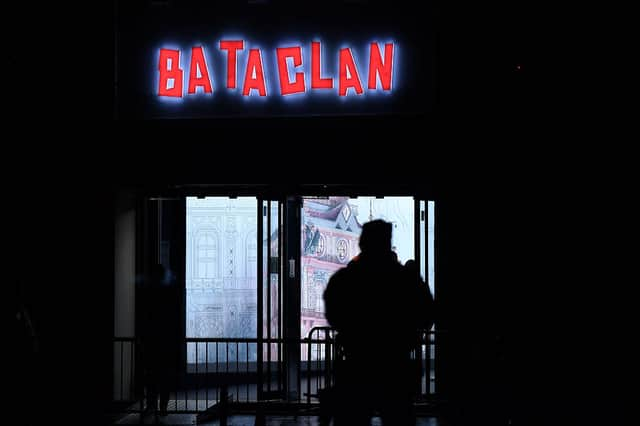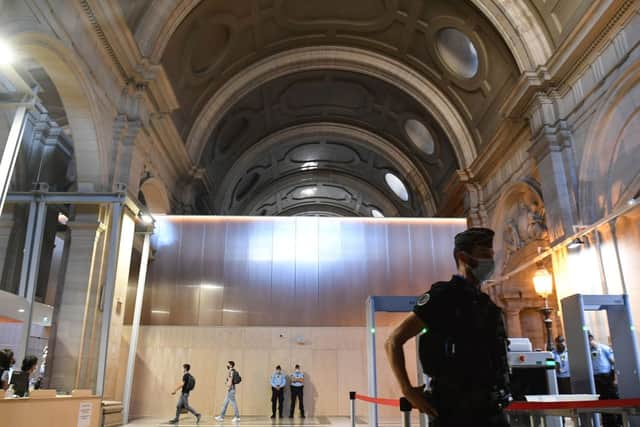Paris attacks: what happened at Bataclan and Stade de France in November 2015 and Salah Abdeslam sentencing


A trial investigating the terrorist attacks on Paris in November 2015 has concluded.
Salah Abdeslam, the lone surviving attacker, has been convicted of murder and sentenced to life in prison without the possibility of parole.
Advertisement
Hide AdAdvertisement
Hide AdAmong other charges, the 32-year-old was also found guilty of attempted murder in an orchestrated attack which killed 130 people around the Bataclan and Stade de France.
The attacks involved nine gunmen and suicide bombers strike within minutes of each other at France’s national soccer stadium, the Bataclan concert hall and Paris restaurants and cafes.
The incident was the deadliest attack on French soil since World War II and the trial, which took place in a specially designed and constructed courtroom within the 13th-century Palais de Justice in Paris, began in September 2021.
Here is everything you need to know about it.
What happened in Paris?
The incident began on the evening of 13 November 2015, when two explosions were heard near the Stade de France, where President Francois Hollande was watching France play Germany in an international friendly, at around 9.30pm (8.30pm UK time).
Advertisement
Hide AdAdvertisement
Hide AdAn hour later, there were reports of a shooting at the Petit Cambodge restaurant, about five miles away from the Stade de France.
By 10pm, French Police had confirmed that at least 18 people had been killed. Meanwhile, there were also reports of shootings near the Bataclan theatre, south of the restaurant, where the American rock band Eagles of Death Metal were playing to 1,500 fans.
Within ten minutes, police officials confirmed that the death toll had risen to at least 26 people, 15 of whom were killed in the Bataclan theatre.
They also said that an ongoing hostage crisis had developed at the theatre. Between 60 and 100 people were reportedly being held hostage.
Advertisement
Hide AdAdvertisement
Hide AdAt around 11pm, President Hollande placed the whole of France under a state of emergency and announced that the country’s borders had been closed.
Around 20 minutes later, French police confirmed two suicide attacks and one bombing near the Stade de France stadium. At least three people were believed to have died in those attacks near the stadium.
Soon after that, there were reports of shots and explosions at the Bataclan theatre.
As the French military made their way into the centre of Paris, the police outside the Bataclan theatre stormed the building shortly after 10.30pm; police officials confirmed security forces had launched an assault on the theatre and two attackers had been killed.
Advertisement
Hide AdAdvertisement
Hide AdOne official described “carnage” inside the building, saying the attackers had thrown explosives at the hostages, and it was confirmed that 80 people were killed inside the Bataclan theatre.
130 victims died as a result of the attacks, which left a total of 416 people injured.
Who is being tried?
Twenty men are charged, but only 14 will be on trial.
That is because six are being tried in absentia; five of the six are presumed dead, while the whereabouts of one man is unknown.
Salah Abdeslam, the lone IS survivor believed to have been directly involved in the attacks on the night, is the key defendant among those being tried, and is the only one being charged with murder.
Advertisement
Hide AdAdvertisement
Hide AdAbdeslam abandoned his rental car in northern Paris and discarded a malfunctioning suicide vest before fleeing home to Brussels.
He has so far refused to speak with investigators, but it is thought he holds the answers to many of the remaining questions about the attack and the people who planned it.
He will be questioned multiple times throughout the trial.
How long will the trial last?


The trial is scheduled to last nine months.
The month of September will be dedicated to laying out the police and forensic evidence, while October will be given over to victims’ testimony.
From November to December, officials including former French President François Hollande will testify, as will relatives of the attackers.
The verdict is scheduled at the end of May.
Can I watch the trial?
Advertisement
Hide AdAdvertisement
Hide AdVideo recording has only been allowed for a handful of cases in France considered to be of historical value, including last year’s trial for the 2015 attacks against the Charlie Hebdo newspaper.
None of the proceedings of this trial will be televised or rebroadcast to the public, but they will be recorded for archival purposes.
Comment Guidelines
National World encourages reader discussion on our stories. User feedback, insights and back-and-forth exchanges add a rich layer of context to reporting. Please review our Community Guidelines before commenting.
